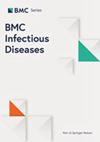Epidemiological characteristics of human rabies cases reported by sites in China from 2006 to 2022
IF 3
3区 医学
Q2 INFECTIOUS DISEASES
引用次数: 0
Abstract
Rabies is an incessant public health threat in China. The Ministry of Health implemented the Central Payment for Rabies Prevention and Control Project to assist with rabies prevention and control in a few representative provinces in 2006. Data on human rabies cases reported by the National Infectious Disease Reporting Information Management System and national surveillance sites from 2006 to 2022 were collected, and statistical and multivariate analyses were then used to assess the effectiveness of current prevention and control efforts. During 2006–2022, a total of 2025 human rabies cases were collected by the national surveillance sites, with incidence rates far above the national average, but the incidence rate was consistent with the national trend. Human rabies cases demonstrated a dual peak distribution in terms of exposure and onset dates, with the peak exposure dates falling mostly in the spring and summer and the peak onset dates occurring mostly in the summer and autumn. Three danger categories are shown by the geographical distribution: high, medium and low. Dogs had a high infection rate (86.93%), with own domesticated dogs accounting for the majority of infections. The rates of post-exposure prophylaxis are not constant. The median incubation period was 71 days. Various measures and policies implemented by the government have played a key role in reducing the incidence of rabies. To effectively prevent and control the resurgence of epidemics and halt the spread of the virus among host animals, it is imperative to prioritize and implement a robust dog management system, accelerate research and development of animal vaccines and improve the level of post-exposure prophylaxis.2006 年至 2022 年中国各地点报告的人感染狂犬病病例的流行病学特征
狂犬病是中国持续存在的公共卫生威胁。卫生部于 2006 年在几个有代表性的省份实施了狂犬病防控中央支付项目,协助开展狂犬病防控工作。项目收集了 2006 年至 2022 年全国传染病疫情报告信息管理系统和全国监测点报告的人感染狂犬病病例数据,并通过统计和多变量分析评估了当前防控工作的成效。2006-2022 年间,国家监测点共收集到 2025 例人类狂犬病病例,发病率远高于全国平均水平,但发病率与全国趋势一致。人类狂犬病病例在暴露和发病日期上呈现双高峰分布,暴露高峰期多在春夏两季,发病高峰期多在夏秋两季。地理分布显示出三个危险类别:高、中、低。狗的感染率较高(86.93%),其中自家驯养的狗占大多数。暴露后预防率并不恒定。潜伏期中位数为 71 天。政府实施的各种措施和政策在降低狂犬病发病率方面发挥了关键作用。为了有效预防和控制疫情的再次发生,阻止病毒在宿主动物中的传播,当务之急是优先考虑并实施健全的犬只管理制度,加快动物疫苗的研发,提高暴露后预防的水平。
本文章由计算机程序翻译,如有差异,请以英文原文为准。
求助全文
约1分钟内获得全文
求助全文
来源期刊

BMC Infectious Diseases
医学-传染病学
CiteScore
6.50
自引率
0.00%
发文量
860
审稿时长
3.3 months
期刊介绍:
BMC Infectious Diseases is an open access, peer-reviewed journal that considers articles on all aspects of the prevention, diagnosis and management of infectious and sexually transmitted diseases in humans, as well as related molecular genetics, pathophysiology, and epidemiology.
 求助内容:
求助内容: 应助结果提醒方式:
应助结果提醒方式:


